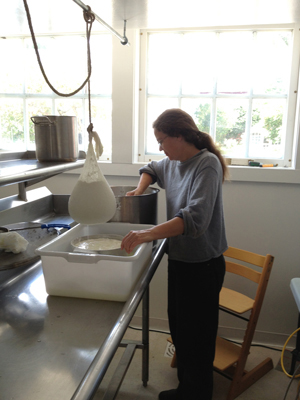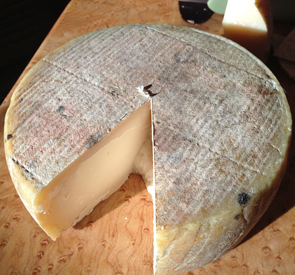 Customers who pop into Main Street Cheese in Hancock can buy goat cheese and meat on the honor system. But they can also visit with some of the goats behind the small store or peek through a window to see how the cheese is made.
Customers who pop into Main Street Cheese in Hancock can buy goat cheese and meat on the honor system. But they can also visit with some of the goats behind the small store or peek through a window to see how the cheese is made.
Sarah Gilliatt started her artisan goat cheese venture as a way for people to experience the cheese making process from start to finish. But she also wanted to show customers how sustainable farming can make a difference to the planet and local economy.
Main Street Cheese sells a variety of fresh and aged cheeses, as well as various cuts of goat meat.
Gilliatt spent most of her career working for nonprofits focused on economic justice. “That led me to work on sustainable agriculture policy,” she says. Then while living in co-housing in New Mexico where residents collectively cared for goats, she fell in love with goats, eventually dabbling in cheese making. When her family returned to NH in 2012, she decided to make it a full-time business.
 “I love the cheese making and being with the goats, but it’s also a platform for me to talk about bigger issues,” she says.
“I love the cheese making and being with the goats, but it’s also a platform for me to talk about bigger issues,” she says.
“We don’t need vast distribution networks and greater packaging to send food all over the planet with huge ecological costs and very high greenhouse gas emissions.”
Locally-grown food is typically more nutritious, Gilliatt says, adding sustainable farming also strengthens water cycles that cool the planet. “It preserves rural character, builds community, creates happiness through a sense of belonging to community, addresses chronic health issues and builds resilience during a crisis as we shorten supply chains, as we have seen in COVID, and this strengthens food security,” she says.
Gilliatt opened Main Street Cheese in 2013, and she is passionate about being part of the local community. “There’s a beautiful definition from an Irish thinker. He described local as being in the area of where you can hear the church bells,” she says. “In Hancock, we have beautiful church bells, and I think of that often.”
Gilliatt says it has been difficult to turn a profit and adds NH farmers lose $8 million annually raising crops and livestock. “If each New Hampshire resident purchased $5 worth of food a week from a New Hampshire farm, those farms would earn $349 million in income, which is one and half times current sales,” she says of the findings of an agricultural study of NH conducted a few years ago. “New Hampshire’s residents spend $4 billion annually purchasing food sourced outside the state.”
Gilliatt is partnering with Black Spruce Farm in Jaffrey to double her herd of milking goats. And, this summer on Saturdays, Main Street Cheese will offer a “walking meditation” outdoors that will be followed by tours of her farm and cheesery, and a cheese tasting. She also plans to add yogurt to her product line.
Gilliatt says she wants to demonstrate that farms can remain small and succeed. “My goal is to eventually show how small can not only be beautiful but profitable,” she says.

 Current Issue - April 2024
Current Issue - April 2024